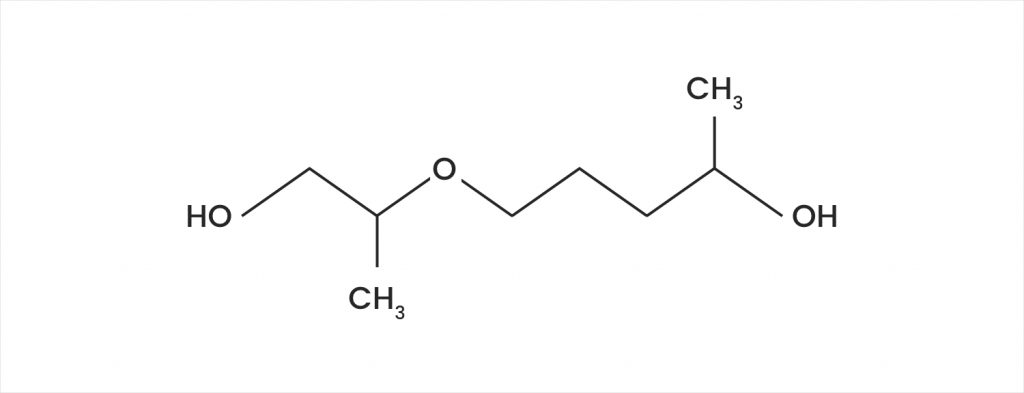What Is Dipropylene Glycol?
Dipropylene glycol is a type of alcohol that is used in cosmetics and skincare products to improve the texture and stability of the formulation. It is mainly used as a solvent, viscosity-decreasing agent, masking agent, and fragrance ingredient.
Dipropylene glycol is a member of the glycol class of compounds. Simply put, ‘glycol’ is a term for any organic compound belonging to the alcohol family. A glycol, which may also be referred to as a diol, is composed of two hydroxyls groups attached to different carbon atoms. There are many different types of compounds that belong to this family, such as butylene glycol, polyethylene glycol, ethylene glycol, and more. Dipropylene glycol is a colorless, nearly odorless liquid with a high boiling point and low toxicity. In addition to use in the cosmetic industry, dipropylene glycol finds many uses as a plasticizer and an intermediate in industrial chemical reactions.

Dipropylene Glycol
the good: It is used to improve the texture and stability of a formulation.
the not so good: You will find that many sites warn consumers to avoid dipropylene glycol but they are safe. This misconception comes from its uses outside of the skincare industry.
Who is it for? All skin types except those that have an identified allergy to it.
Synergetic ingredients: Works well with most ingredients.
Keep an eye on: Nothing to keep an eye on here.
Why Is Dipropylene Glycol Used?
In cosmetics and skincare products, dipropylene glycol functions as a solvent, viscosity-decreasing agent, masking agent, and fragrance ingredient.
Solvent
As a solvent, dipropylene glycol helps to dissolve or suspend other ingredients in a formulation without altering the other ingredients. Dipropylene glycol allows for an even distribution of all ingredients in a cosmetic formulation and provides appropriate consistency for the product.
Texture
Furthermore, solvents like dipropylene glycol are used to thin out formulations and decrease viscosity. The term viscosity corresponds to the concept of the thickness of a product. Decreasing the viscosity of a formulation makes the product more spreadable when applied to the skin or hair. Solvents can also increase the efficacy of active ingredients in a product formulation by enhancing their absorption through the skin.
Masking
Dipropylene glycol also functions as a masking agent in cosmetics and personal care products. A masking agent is used to disguise the natural smell of the active ingredients, especially those that have an unpleasant smell. Sometimes, a masking agent can make a product smell so ‘clean’ that consumers think the product is fragrance-free.
Is Dipropylene Glycol Safe?
If you research dipropylene glycol or any member of the glycol family, you’ll find that many sites warn consumers to avoid them. These sources claim that the glycols are irritating and harmful to your skin. You might even learn that glycols are found in antifreeze. This is true, but the glycol that is used in antifreeze is different from dipropylene glycol. Glycols are a broad class of chemicals and they are not created equal. While some of the glycols would most definitely be undesirable in personal care products, dipropylene glycol is considered to be safe and effective.
The safety of dipropylene glycol and other glycols has been assessed by the Cosmetic Ingredient Review (CIR) Expert Panel, a group responsible for evaluating the safety of skincare and cosmetic ingredients. Clinical tests have determined that the glycols produce mild to severe irritation to the eyes. Other tests have evaluated numerous cosmetic products containing these glycols at concentrations up to 21.4% in various human skin irritation studies. These tests revealed that the degree of irritation produced is dependent on the particular product, and there was no correlation between the degree of irritation and the concentration of the glycol present in the product. Furthermore, there were no reactions indicative of skin sensitization to these glycols in any skin sensitization assays and no suggestions of phototoxicity or photosensitization. Therefore, the CIR Expert Panel concluded that dipropylene glycol and the other glycol ingredients were safe for use in cosmetics and personal care products.







